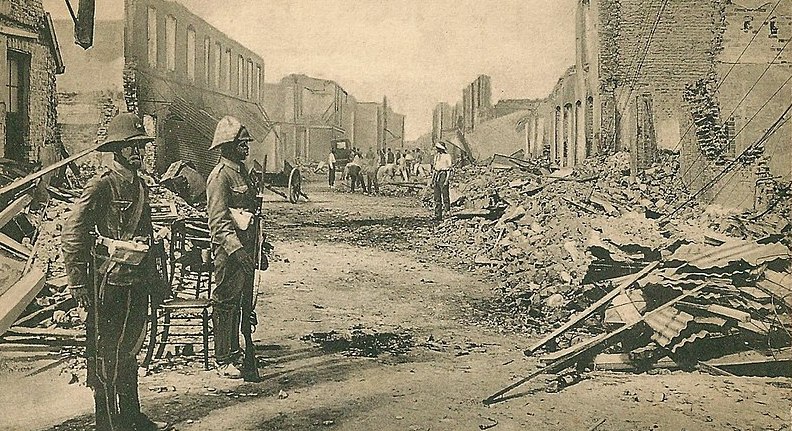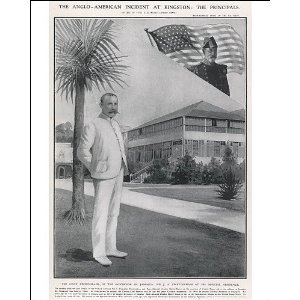
What Winston Churchill was Doing on January 24th
January 24th in the Churchill Saga
(Updated from first appearance in 2012.) A reader writes to ask what Winston Churchill was doing on January 24th, 1907. I hadn’t the foggiest idea. So I spent awhile trawling through the 100 million words by and about him compiled by the Hillsdale College Churchill Project.
By the way, you can subscribe free to the Churcill Project for notifications of articles, events and videos. Click here, scroll to bottom, and fill in your email in the box entitled “Stay in touch with us.” Your email address is never given out and remains a riddle wrapped in a mystery inside an enigma. (You can subscribe similarly to this site: see “Subscribe and Follow” at right.)
It seems something was often happening in Churchill’s life on January 24th. It is best known as day his father died (1895), and when he dief as well (1965). A synopsis of each January 24th in his life would be interesting—as it would be for September 11th, that day of infamy.
On January 24th, 1907…

…Churchill was at the Colonial Office, London, dealing with an upcoming Colonial conference and a diplomatic kerfuffle. The Governor of Jamaica, Sir James Alexander Swettenham, had churlishly demanded that marines from an American warship, USS Missou, return immediately to their ship. The ship was at Kingston during the devastating earthquake of January 14th. American crew members had been sent into town to lend humanitarian assistance.
Governor Swettenham, under the pressures of the moment, felt this action unnecessary and impertinent. He declared that the American action was like a visiting “British admiral landing an armed party to support the New York police.” Rear Admiral Charles H. Davis, Jr. took offence in return, and his complaints reached higher authorities.
On January 24th Churchill advised King Edward VII that, acting on a telegram from Lord Elgin, the Colonial Secretary (in Scotland), Swettenham had been rebuked and ordered to apologize to the Americans. Sir Alexander did, and immediately resigned. Though a distinguished colonial administrator in British Guiana before Jamaica, he never held office again. He died in obscurity in 1933.
Tourmaster and host
Searches for the date uncover two January 24ths when Churchill acted as PR man. January 24th, 1941 found him escorting Harry Hopkins, President Roosevelt’s envoy, to Dover. There they toured British gun emplacements. The same day he wrote FDR, inviting him to tour the new battleship HMS King George V, arriving at the Chesapeake. It was all part of Churchill’s campaign to convince the President that Britain was in the war to the end. Hopkins’ favorable impressions led to the FDR-Churchill Atlantic Meeting in Newfoundland.
On the January 24th, 1943, America was two years at war, and the Anglo-Americans met at Casablanca. There Roosevelt demanded Germany’s “unconditional surrender”—a much debated declaration. Again the jolly host, Churchill took the President by car to Marrakesh, which he called “the most beautiful place on earth.” Together they watched the sun set over the Atlas Mountains, and pondered an uncertain future.
But the most unusual January 24th I was reminded of came ten years later…
January 24th, 1953
In 1983, Sir John Colville, Churchill’s longtime private secretary, addressed my first Churchill Tour in London. He a told a remarkable story. It’s best in his own words.
I went up to his bedroom one morning to talk about something, and he was shaving. He said to me, “Today is the 24th of January.” I said yes, and he said, “It’s the day my father died.” I said something suitable, and he went on: “It’s the day I shall die, too.” There wasn’t any comment I could make. I just said yes and went on with whatever it was he wanted me for. But I remembered. It stuck in my memory.
Twelve years later, I think on the 10th of January, his family rang me up from Hyde Park Gate. They said he’d had a stroke—a big, final stroke—and the doctor said there was no chance of his surviving. My wife will bear me out, as she was in the room. I said: “He won’t die until the 24th.”
Ten minutes later they rang up from Sandringham, because The Queen’s private secretary didn’t want to bother Hyde Park Gate in case things were happening.. They thought that I might know something, since I was executer and trustee. The private secretary said, “Do you know the latest about Sir Winston?” I said yes, I’d heard. And again I said that he wouldn’t die until the 24th. Martin Charteris, who was the secretary, remembers to this day that I said that.
Churchill lay in a coma for 14 days and on the 24th of January he died. I can’t explain it. It may be coincidence. But it is, I think, the oddest single experience I’ve ever had in my life.







One thought on “What Winston Churchill was Doing on January 24th”
What an unusual and remarkable man Winston Churchill was. Thanks for the story.
Comments are closed.